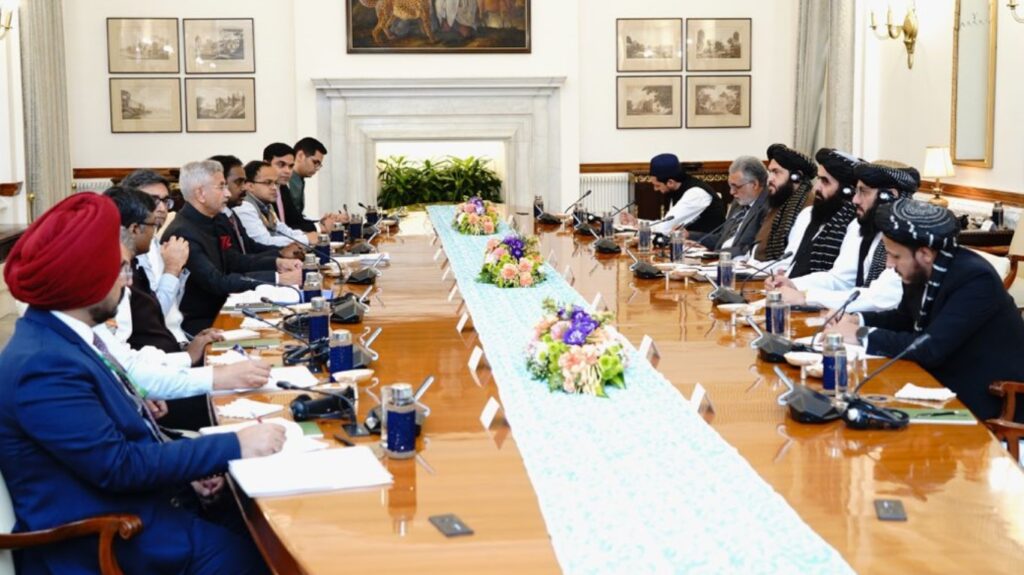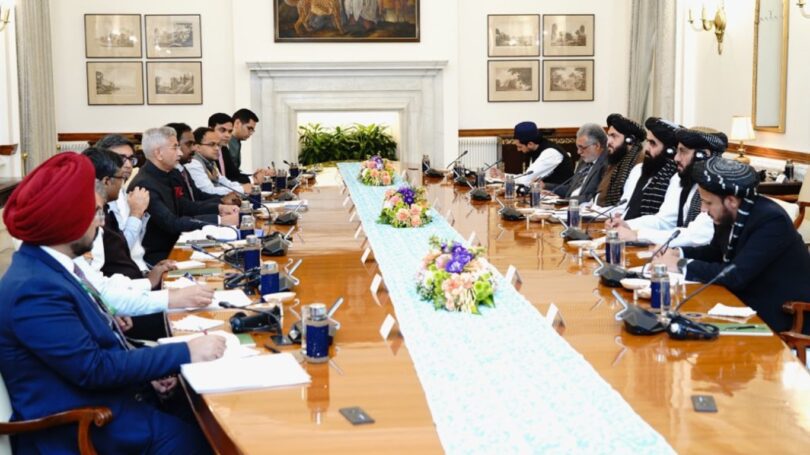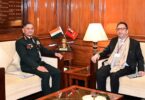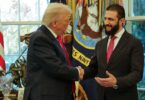Taliban Foreign Minister Amir Khan Muttaqi’s India visit, accompanied by Afghan trade and foreign ministry officials, which began on October 10, is hot news. External Affairs Minister (EAM) S Jaishankar held delegation level talks with Muttaqi, after which both foreign ministers held a joint press conference where women reporters were not allowed to attend. According to one post, Muttaqi was also to meet Prime Minister Narendra Modi, Chiefs of the Indian Army and the Indian Air Force, as well as Parag Jain, Director Research & Analysis Wing (https://www.facebook.com/reel/1586307049200192). On October 11 and 12, Muttaqi visited Darul Ulum Islamic seminary in Deoband (Uttar Pradesh), where he met Afghan students.
Muttaqi visited India after the United Nations gave a “temporary exemption” from the travel ban on him; allowing him to visit India from October 9 to 16. But who influenced the UN? Certainly not India although some analysts feel Muttaqi’s visit would help the government garner Muslim votes in the upcoming Bihar elections (where government has already dished out INR 7,500 crore to Bihar – INR 1,000 in each woman’s account for her vote). China and Russia wouldn’t have influenced the UN either. If Qatar managed to bribe the UN, who is behind Qatar? Is this part of the Great Game the US is playing in the Middle East and West Asia?
Government has denied it barred women reporters from the joint press conference, which is an obvious lie. Taliban’s ultra regressive misogynistic policies are well known and visuals during the recent earthquake showed bodies of women buried in rubble were not pulled out. Contrast this with our political hierarchy sloganeering ‘Nari Shakti’, announcing women empowerment schemes, and the like? If our EAM was a lady, would she be asked to wear a hijab or burqa to meet Muttaqi? Would presence of women reporters have conveyed the right message to Muttaqi and the Taliban about what India stands for? Not doing so is viewed as unwarranted bootlicking.
EAM Jaishankar and NSA Ajit Doval held the same posts as today, when India withdrew its diplomats and staff from its missions in Afghanistan in 2021, leaving behind the Afghan staff, which is now being referred to as “technical team”. This was despite the Taliban asking them to not leave Afghanistan, assuring them their safety. Why did we run away – were we so scared of Pakistan despite Taliban assurances?

Pakistan no doubt is rattled with Muttaqi’s visit and has resorted to airstrikes in Kabul in the Abdul Haq Square area. Muttaqi condemned the bombing and said, “We consider this act of Pakistan wrong… We want better relations with India and Pakistan, but it cannot be one-sided... The courage of Afghans should not be tested. If someone wants to do this, they should ask the Soviet Union, America and NATO, so that they can explain that it is not good to play games with Afghanistan”.
Heavy fighting between Afghan and Pakistani forces is reported along the Durand Line. Afghanistan has claimed capturing a number of Pakistani army posts. Qatar, which funds terrorism worldwide but poses a peace-broker, has called for restraint. According to the abovementioned Facebook post (https://www.facebook.com/reel/1586307049200192), Afghanistan has said an attack on India will be considered an attack on Afghanistan and India has said an attack on Afghanistan will be considered an attack on India - akin to the Saudi Arabia-Pakistan Defence Agreement (SPDA). Now that Pakistan has bombed Kabul, are we going to bomb Islamabad – launch the next phase of Operation ‘Sindoor’?
Pakistan reacted strongly to the India-Afghanistan joint statement during Muttaqi’s visit calling Jammu and Kashmir part of India (https://www.hindustantimes.com/india-news/pak-summons-kabul-ambassador-india-afghanistan-joint-statement-terrorism-amir-khan-muttaqi-jammu-kashmir-101760232702427.html), while saying it wants good relations with Afghanistan. A social media post wonders if this has led to Defence Minister Rajnath Singh lying under a tree like Newton and singing his favourite song that Pakistan occupied Kashmir (POK) will automatically fall into his lap.
Highlights of India-Afghanistan joint statement issued on October 10 include: Jaishankar appreciated Afghanistan condemning the Pahalgam massacre on April 22; both sides emphasized respect for each other’s sovereignty and territorial integrity; Muttaqi appreciated India’s role as the first responder in the recent earthquake; both sides agreed to India deepening engagement in development projects in Afghanistan; India will gift twenty ambulances to the Afghan people; India continues to offer scholarships to Afghan students; India willing to assist reconstruction in earthquake affected areas; both sides reviewed India’s humanitarian assistance to Afghanistan, commencement of the India-Afghanistan Air Freight Corridor and agreed to maintain close communication and continue regular engagement.
Jaishankar’s exuberance over Muttaqi’s call for India to invest in Afghanistan’s minerals is premature. Have we examined why is China doing only limited Copper mining in Afghanistan, despite beginning oil production in October 2012, extracting 1.5 million barrels of oil annually? The catch in all this is having a secure environment especially since no foreign venture is permitted to bring its own security forces along. Do we expect the Taliban to provide security for Indian private company projects, especially in mining ventures in widespread isolated regions? Could we have proposed to Muttaqi establishing an Afghan Central Industrial Security Force with Indian assistance, which would also benefit unemployed Afghans?
About a dozen countries, including China, Russia, Iran, Pakistan and Turkey have embassies operating in Kabul, while Russia has formally recognised the Taliban administration. Taliban has had a political office in Doha since 2013, where the US-EU also interacts with Taliban. Since 2021, Pakistan has had a Taliban ambassador. China has had a Taliban ambassador since 2023. Now India has announced the opening of its full-fledged embassy in Kabul, which is an indirect recognition of the Taliban regime ruling the Islamic Emirate of Afghanistan. Had India not pulled out its diplomats and Indian staff from Kabul in 2021, we could have: developed bilateral relations with Taliban; improved economic and trade relations with them; seized the opportunity to not dilute our influence in the region, which is being claimed now; reassured Hindus and Sikhs in Afghanistan against persecutions; explore investing in Afghanistan’s mineral wealth.
Decades of targeted persecution and violence by extremist groups have forced Hindu and Sikh communities to flee Afghanistan. Major attacks on Sikh and Hindu minorities included: suicide bombing targeted a group of Sikhs and Hindus in Jalalabad in June 2018, killing at least 19; 25 Sikhs killed during attack on Gurdwara Har Rai Sahib (Kabul) in March 2020; attack on a Kabul gurdwara killing two in June 2022. Beyond large-scale assaults, Sikhs have endured daily threats, harassment, and kidnappings for ransom. The Taliban gave security assurances to minorities in December 2021, but these have failed to prevent attacks and harassment; the Taliban's ability and willingness to protect minorities is considered limited. Moreover, the Taliban's strict interpretation of Sharia Law poses a threat to religious minorities through institutional discrimination. India and other nations have organized evacuation flights and special visa processes for Afghan Sikhs and Hindus seeking refuge.
On July 7, 2008, a suicide bomber detonated his Vehicle Borne Improvised Explosive Device (VBIED) at the main gate of the Embassy of India in Kabul in which 59 persons were killed including four Indian officials and a local driver. More than 150 persons, including 5 ITBP personnel were seriously injured in the incident. Notably, a Taliban website claimed responsibility for the attack.
The US handed back Afghanistan to the Taliban after 20 years on August 26, 2021, suffering 19 killed while exiting. But in these 20 years, the US continued its practice of promoting terrorism by inducting ISIS cadres from Iraq-Syria into Afghanistan (via Pakistan), conducting joint ISIS-US Special Forces operations in Afghanistan (photographic evidence of which exists), and allowing Pakistan to raise the ISKP in Peshawar and push it west into Afghanistan. During the same period, Al Qaeda declared its full support to the Taliban, which continues to date.
Muttaqi has said no Pakistan-based terrorist groups are operating in Afghanistan. But ISIS and the ISKP (which has elements of LeT and ISI) are operating in Afghanistan. Also, Al Qaeda supports Taliban but is not controlled by Taliban, and Al Qaeda’s offshoot AQIS is active in South Asia. The Taliban and the Tehreek-e-Taliban Pakistan (TTP) are conjoined twins, and both aim for a Global Islamic Emirate and Rule of Sharia. This should be seen in context of CIA-backed Bangladesh and Pakistan preparing for Ghazwa-e-Hind. Expanding Indian presence in Afghanistan will hardly be welcomed by the US and China, leave aside Pakistan, as well as extremist groups like ISIS, ISKP, Al Qaeda – and ultra-hardcore within the Taliban?
Some analysts are voicing that increased India’s strategic influence in the region following Muttaqi’s visit will diminish or counterbalance Chinese influence in Afghanistan. These utopians fail to recognize that Taliban delegations have been visiting Beijing. China is the intermediary between Pakistan and Taliban, and the CPEC is being extended to Afghanistan. Besides, the message from the China-Pakistan-Afghanistan Trilateral Dialogue is more than clear. Muttaqi’s visit was not a favour to India. It was for mutual benefit, if not more beneficial to the Taliban by way of establishing a perception of legitimacy at home and globally.
Jaishankar became Modi’s favourite, especially after his role as ambassador in Washington DC. As the EAM, he has also arranged the highest civilian awards of some 21 countries for Modi. Recent approaches of the foreign policy, especially with regards to India’s immediate neighbourhood Nepal and Bangladesh, have been questioned increasingly. Strategically, we do need to advance our relationship with the Taliban but rushing in without analysing nuances of the Great Game can have adverse fallouts.
The author is an Indian Army veteran. Views expressed are personal.
More on topics covering Afghanistan and the Taliban:
US-Taliban Scrimmage over the Afghan Bagram Air base: https://www.thestrategicperspective.org/us-taliban-scrimmage-over-the-afghan-bagram-air-base/
ISKP in its propaganda magazine Voice of Khurasan forewarns the Taliban prior to its assassination of Khalil Rahman Haqqani: https://www.thestrategicperspective.org/visual-composer-1632/
Internet Shutdown in Afghanistan Threatens Women’s Education and Human Rights: https://www.thestrategicperspective.org/internet-shutdown-in-afghanistan-threatens-womens-education-and-human-rights/
The Bangladesh-Pakistan Affair: https://www.thestrategicperspective.org/the-banpak-affair/
Juggling the American Eagle and the Sino Dragon: https://www.thestrategicperspective.org/juggling-the-american-eagle-and-the-sino-dragon/
Islamic State Khorasan Province (ISKP) declares war on Pro Independence Baloch groups: https://www.thestrategicperspective.org/islamic-state-khorasan-province-declares-war-on-pro-independence-baloch-groups/
Re-emergence of AQIS poses a threat in the Indian subcontinent: https://www.thestrategicperspective.org/aqis-the-reemerging-threat-in-the-indian-subcontinent/










